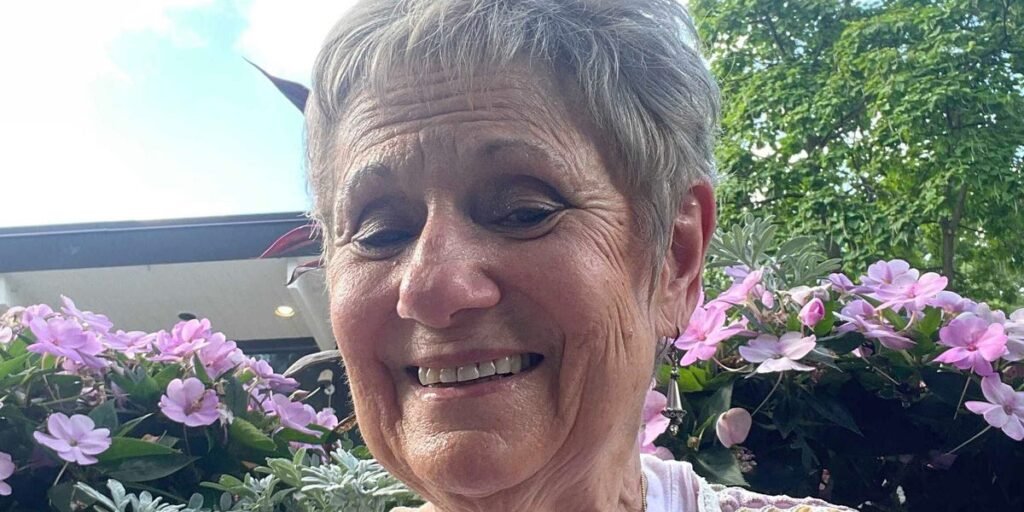This as-told-to essay is based on a conversation with Dianne Michels, 81, who works at Trader Joe’s in the Chicago area while developing a consulting and coaching business. She works to pay down her $70,000 in debt and fund the business, which she hopes will live on beyond her. This interview has been edited for length and clarity.
Part of me never wants anybody to know how old I am because I don’t want them to treat me like I’m an old person. The way people in retirement are treated is like they’re no longer relevant.
I started my career at a telephone company in Fargo when I was 19. I went to college but dropped out because I didn’t want to be a nurse or a teacher, and it seemed like those were the only options for women back then. They trained us for six weeks as service representatives.
I got married at 20, and we had two children. I supported my husband financially through his last two years of college, which was a common thing in those days.
We didn’t know what we were doing at such a young age, and we got divorced when I was 25. I had a series of relationships for the next 10 to 15 years, and I was engaged at one point, but I never remarried.
After my divorce, I became active in politics
I worked at the State Attorney’s office and volunteered for a congressional campaign. The campaign manager asked me to work for her at a company that sold office products to physicians and dentists. I became their first female vice president.
I worked there from 1973 until 1990, during which the company was acquired. In 1989, we relocated the marketing function to corporate in Minnesota, and I felt the real impact of working in a corporate setting. I left because I was not cut out to be a corporate female in a male-dominated organization.
I internalized that people embrace responsibility at work as a gift rather than a burden to survive. If I see one more ad on TV showing elderly people saying, “I just wanted money so I can go out to dinner and see my grandchildren.” There’s so much more that is possible for us in terms of making a difference in the world.
In 1990, I opened a career consulting business
I did career consulting, but it didn’t generate the income that it needed, so I closed it after two years. I relocated to Chicago in 1993 and went to college in the evenings and weekends while working in public relations.
I fell into human resources, working as a consultant and then for a few HR organizations. I launched Serendipity HR, my human resources booking business, in 1998 and kept it until 2014.
After that, I became the chief possibility officer at the YWCA Metropolitan Chicago. I left in 2018 to write a book.
I have about $70,000 in debt
I’m in debt in part because of my own lack of awareness about money. I have some personal debt of about $7,000, and the rest is credit card debt. Much of this was investing in my website, getting my book published, and supporting the startup costs of a business.
I have arrangements with three of the four credit card companies, where I pay off the debt every month. I’m committed to being debt-free within 18 months.
My Social Security allotment is around $2,500 monthly
I took my Social Security early at 62 because I needed the money. I don’t live in regret, but if I had to do it over, I’d certainly wait to take it, which would’ve given me about a third more. I was very short-term-financially oriented, instead of thinking beyond cash flow.
I didn’t know anything about financial security. I grew up in a family that was not focused on investing or financial literacy. We were more focused on getting a good job and keeping that job until retirement. I’ve been very irresponsible and reckless.
I’ve always refused to be limited by financial circumstances
I’m building a consulting and coaching business called Possibility Partners. The people who are going to pay me don’t necessarily care whether their employees are making a difference — they care about the bottom line, growth, revenues, and productivity.
I need to address their concerns, so I’ve shifted my business to focus more on creating standard operating practices and relationships, which will save money and increase productivity and retention.
I just started a very aggressive sales program. I’m reaching out to people via email or text to ask for their help.
While building my business, I’m working at Trader Joe’s
I needed cash flow to get out of debt and promote my business. In November, I dropped off my résumé at six Trader Joe’s locations, went in for an interview at one of them, and two days later, I was working. The speed from résumé submission to hire was incredibly respectful.
Working at Trader Joe’s allows me to do the work and come home to focus on building my business. I do have a little snob in me — I wouldn’t work for some other grocery stores. I briefly worked at Trader Joe’s in 2013, so I knew it was a good fit for me.
I work Friday, Saturday, Sunday, and Monday, so I have Tuesday, Wednesday, and Thursday to devote to my business. I work the cash register, stock shelves, and do food demos. There isn’t much of a hierarchy that can create discrepancies in relationships or competition. The management team has been very accommodating, especially of my schedule.
Family is at the top of my list
Part of working on my own business is having the flexibility to babysit if my daughter wants to go on vacation. I’m planning to move closer to my daughter in Michigan next year.
Trader Joe’s is temporary work, and as soon as Possibility Partners is firmly established with robust client engagement and partners, I will give up my job to devote all my time to the business.
Read the full article here



